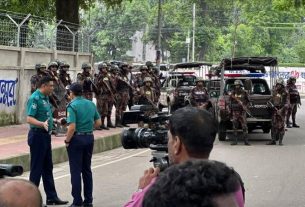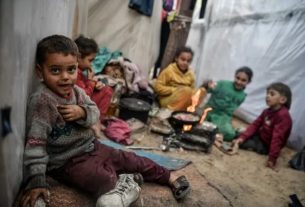Tehran, Iran – The top foreign policy representatives of Iran and the European Union have signalled that efforts to restore the country’s 2015 nuclear deal will continue, after they held a meeting in Jordan.
Iran’s Foreign Minister Hossein Amirabdollahian and the bloc’s foreign policy chief Josep Borrell sat down on the sidelines of the second meeting of the Baghdad Conference for Cooperation and Partnership hosted by Jordan’s King Abdullah on Tuesday.
Iran’s top negotiator in the nuclear talks, Ali Bagheri Kani, and the bloc’s coordinator, Enrique Mora, were also present. Borrell wrote on Twitter following the meeting that it was a “necessary” talk amid “deteriorating Iran-EU relations”.
“Stressed need to immediately stop military support to Russia and internal repression in Iran” he wrote, adding that the two sides agreed to keep talking with the aim of restoring the Joint Comprehensive Plan of Action (JCPOA), as the nuclear deal is formally known.
Talks in Vienna to restore the deal that the United States unilaterally abandoned in 2018 began in April 2021 and have faced a deadlock since early September, when Western officials claim Tehran presented demands beyond the deal – something Iran denies.
Protests that erupted in mid-September and the new sanctions the EU and the US have since imposed on Tehran over a “brutal suppression” of protesters, in addition to those levelled to punish Tehran’s alleged supply of drones to Russia for the war in Ukraine, have made prospects of actual progress unlikely.
On the other hand, Iran has imposed its own sanctions on the US, the EU and the United Kingdom – another signatory of the nuclear accord along with China, Russia, France and Germany – and has accused the West of being behind the country’s unrest. However, Borrell had said earlier this month that the issues of protests and Ukraine need to be separated from the nuclear deal, as the bloc does “not have a better option than the JCPOA to ensure that Iran does not develop nuclear weapons”.
After Tuesday’s meeting in Jordan, the Iranian foreign ministry said Amirabdollahian told Borrell Iran is ready to finalise the nuclear talks “based on a draft that is a result of months of difficult and intensive negotiations”. Although unconfirmed, this appears to be the August draft presented by the EU, based on which Tehran and Washington had some initial constructive back-and-forth, but ultimately faced a deadlock as they accused each other of reaching too far.
IAEA team in Tehran
There has been no sign of any serious movement on perhaps the most significant roadblock – the issue of an open probe by the International Atomic Energy Agency (IAEA) into nuclear activity in three Iranian sites.
A delegation by the global nuclear watchdog, led by Deputy Director Massimo Aparo, was in Tehran on Sunday and held meetings with Iran’s nuclear chief Mohammad Eslami and officials from the foreign ministry. Neither the agency nor Tehran disclosed details of the meeting.
Iran, which maintains it is not seeking a nuclear weapon, in late November significantly boosted its enrichment of 60 percent enriched uranium in response to a censure resolution passed against it at the IAEA board.
After meeting with Borrell on Tuesday, Amirabdollahian also had a meeting with Omani Foreign Minister Sayyid Badr Albusaidi, who has previously relayed many messaged between Tehran and Washington on the nuclear deal.
The US has publicly maintained that the nuclear talks are currently not a priority for the administration of President Joe Biden amid the protests in Iran.
US-based media outlet Al Monitor reported Monday that legislators are preparing legislation that aimed at Iranian officials and their family members who have been granted entry into the US.__Al Jazeera





